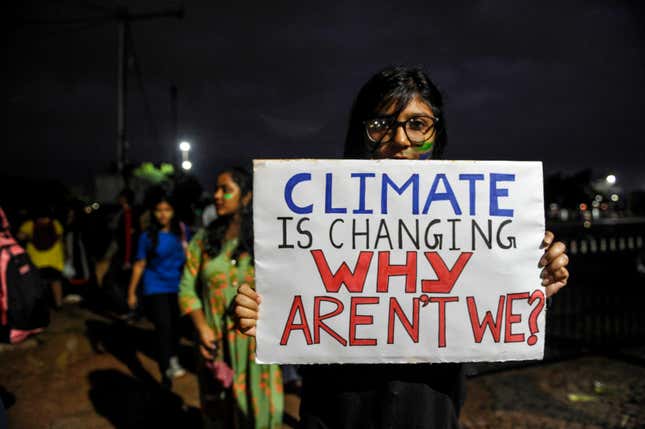
Three Indian environmental organizations’ websites appear to have been censored in the country.
Yash Marwah, founder of the Indian environmental communications organization Let India Breathe, noticed something was wrong with his organization’s website late last month.
“Followers kept coming and telling us that the site is not working,” he told Earther via WhatsApp.
At first, he thought it was merely a traffic overload. But when the issue persisted, Let India Breathe reached out to their internet domain registrar GoDaddy. The company said that National Internet Exchange of India (NIXI), the nonprofit that manages the operations of India’s top level domain registry for the country, had placed their domain on hold. Let India Breathe and the advocacy organization Internet Freedom Foundation reached out to NIXI, which offered no reason for pulling the domain and didn’t provide an opportunity for a hearing. Since then, two other environmental organizations, Fridays for Future India—a chapter of Greta Thunberg’s group—and There Is No Earth B, have seen similar issues with their websites.
“We reasonably have a clear basis, based on our correspondence as well as our technical analysis, that this was a domain seizure by the government of this website,” Apar Gupta, executive director of Internet Freedom Foundation, told Earther, referring to Let India Breathe’s site.
Gupta was not able to discuss the details of the other two cases because many of the groups’ participants are children, but he said it’s “reasonable inference” that the websites were blocked due to censorship “because all three are inaccessible.”
“All three websites relate to climate change, and they all involve very young campaigners who work on these issues,” he said.
In addition to those similarities, all three groups were also running web campaigns and circulating petitions pushing for the Indian Ministry of Environment, Forest, and Climate Change to strengthen guidelines slated to come this year that will determine the regulatory process for all environmental policies and projects in India. The assessment has come under fire by Indian environmentalists because it aims to shorten the time allowed for public hearings on projects and includes exemptions for some polluting industries. The move comes at a time when Indian government has gone full speed ahead during the pandemic to promote coal at home and abroad, ignoring input from people living in the shadow of coal mines, power plants, and export terminals.
“[The] worst part is, they are bringing it in post pandemic times when the entire world is rethinking development,” said Marwah. “So many farmers, tribals, (sic) fisherfolks, villagers will be affected by these in the future but have no say in it.”
The removal of the three websites from the internet comes amid increasing concern about online censorship throughout the nation. Earlier this month, the privacy-focused search engine DuckDuckGo became unsearchable throughout the country—and officials have offered no explanation. Two weeks ago, India also banned access to TikTok and 58 other Chinese apps. And in early June, the Indian government cut off access to the file-sharing service WeTransfer.
Whether it’s censorship or not, for organizers, the shutdown of the three environmental groups websites comes at a particularly inconvenient time. Amid the covid-19 pandemic, in-person organizing is no longer viable and more work is being shifted to online platforms.
“At a time when offline protests are impossible and postal services are also not at their best, the only medium is online,” said Marwah.
NIXI did not immediately respond for comment on this story, but we will update this post if we hear from them.